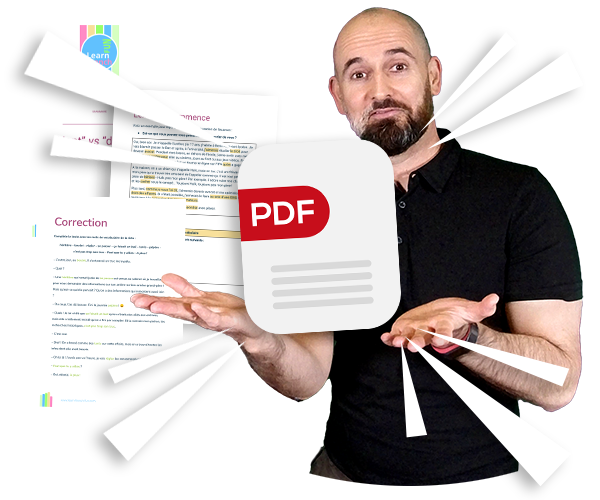A French catch-all word (mot passe-partout) is a word that can be used in any situation, a word that can replace anything and everything. It’s a bit like the original meaning of the phrase Passe-partout, which is a key that will open any door.
In a hotel, for example, the staff has master keys in case a guest loses his key or to clean his room. We name it in French: passe-partout

PDF Bonus
We have prepared a free PDF to help you master French all-purpose words and their more specific equivalents.
👉 Download it for free
At the end, you will have exercises to practice with the correction. 👍
Avoiding boilerplate verbs
I always encourage my students to avoid boilerplate verbs, to make an effort to be precise by using specific terms for specific situations. It will be more elegant and will show that you have a more sophisticated level of French.
Here are some examples of very common boilerplate verbs and how you can replace them, depending on the context:
Avoir (to have)
- Il a eu des difficultés à finir ses études → il a rencontré des difficultés à finir ses études.
He had difficulty finishing his studies - Elle espère avoir l’autorisation de rester en France → Elle espère obtenir l’autorisation…
She hopes to get permission to stay in France - Ce médecin a une bonne réputation → Il jouit d’une bonne réputation.
This doctor has a good reputation - Tu as une grande influence sur ta petite sœur → Tu exerces une grande influence sur elle.
You have a great influence on your little sister - Ce film a eu un grand succès → Ce film a connu un grand succès.
This movie was a big hit - J’ai eu la réponse que j’attendais → J’ai obtenu la réponse que j’attendais.
I got the answer I expected - Mes parents ont une maison dans les Alpes → Mes parents possèdent une maison…
My parents have a house in the Alps - Si tu as des problèmes, appelle-moi ! → Si tu rencontres des problèmes, appelle-moi !
If you have any problems, call me!
Do you like learning French with videos?
Receive our free video newsletter every Friday in your e-mail box. You will get 3 “Tips & Tricks” on grammar, vocabulary, phonetics or French culture.
👉👉 Sign up now!
Il y a (there is)
- Il y avait un arbre immense devant la maison → Un arbre immense s’élevait devant…
There was a huge tree in front of the house - Il y avait des déchets partout dans les rues → Des déchets jonchaient les rues.
There was garbage all over the streets - Il y a toujours de l’eau dans les pots de fleurs → De l’eau stagne dans les pots de fleurs.
There is always water in the flowerpots - Il y a encore quelques erreurs dans ton texte → Quelques erreurs subsistent…
There are still some mistakes in your text - Il y avait un tas de papiers sur son bureau → Des papiers s’amoncelaient sur son bureau.
There was a pile of papers on his desk - Il y aura une foule à l’entrée du théâtre → Une foule se pressera à l’entrée du théâtre.
There will be a crowd at the entrance to the theater - Il y avait un château au-dessus de la ville → Un château se dressait au-dessus de la ville.
There was a castle above the city - Il y avait des champs de fleurs à perte de vue → Des champs de fleurs s’étendaient…
There were fields of flowers as far as the eye could see
Faire (to do)
- Si tu ne lui obéis pas au doigt et à l’oeil, il peut te faire des ennuis → te causer des ennuis.
If you don’t obey him with your finger, he can make trouble for you - Avec sa nouvelle coupe de cheveux, elle fait plus jeune → Elle a l’air plus jeune.
With her new haircut, she looks younger - On va faire une fête pour tes 30 ans → On va organiser une fête.
We’re going to have a party for your 30th birthday - Une baguette et 3 croissants, ça fait 5 euros → Ça coûte 5 euros.
A baguette and 3 croissants is 5 euros - Le journaliste a fait courir cette rumeur → Il a propagé cette rumeur.
The journalist spread this rumor - Tu as fait une erreur impardonnable à ses yeux → Tu as commis une erreur impardonnable.
You made an unforgivable mistake in his eyes - Elle se fait les yeux avant de sortir → Elle se maquille les yeux.
She does her eyes before she goes out - Je ne me ferai jamais à cette chaleur → Je ne m’habituerai jamais à cette chaleur.
I will never get used to this heat
Mettre (to put)
- Tu peux mettre la table, s’il te plaît ? → Tu peux préparer la table, s’il te plaît ?
Can you set the table, please? - Il a mis les bananes trop mûres à la poubelle → Il a jeté les bananes à la poubelle.
He put the overripe bananas in the trash - Tu devrais mettre un peu de sel → Tu devrais ajouter du sel.
You should put some salt on it - Elle met toujours du chocolat fondu sur ses crêpes → Elle étale toujours du chocolat…
She always puts melted chocolate on her pancakes - Elle a mis un pullover → Elle a enfilé un pullover.
She put on a sweater - Tu as également mis un CV avec ta lettre de motivation ? → Tu as joint un CV ?
Did you also put a resume with your cover letter? - Je me suis mis à l’aquarelle → J’ai commencé à faire de l’aquarelle.
I started doing watercolors - Il s’est mis en tête de démissionner → Il a décidé de démissionner.
He got it into his head to quit
TRUC, a French handy all-purpose word
Truc is one of the most common all-purpose words used by the French when they have a word on the tip of their tongue or simply out of a kind of laziness:
« Tu peux me passer ce truc, là, en haut, sur l’étagère… Non, pas le dictionnaire, le truc qui est à côté ! Voilà, c’est ça, merci ! »
“You can pass me that thing, up there, on the shelf… No, not the dictionary, the thing next to it! That’s it, thank you!”
The word truc is not very elegant, of course… But it can be very handy when French is not your first language. You can replace any noun with this little magic word, but be careful, not verbs or adjectives.
So if you don’t know a noun, do as the French do, use truc! In France, we also use it when we have forgotten a person’s name:
- Priscilla: Tu sais, hier, j’ai parlé avec madame… Oh zut, comment elle s’appelle ?… tu sais, Madame Truc, la femme qui habite au 2e étage
You know, yesterday I talked to Madame… Oh gosh, what’s her name?… you know, Madame Truc, the woman who lives on the second floor.
- Priscilla: Hier, j’ai dîné avec Truc… Mince, c’est quoi son nom, déjà ? C’est une de mes anciennes étudiantes… Mais comment elle s’appelle ? Ah oui, Heike, voilà, j’ai dîné avec Heike.
Yesterday, I had dinner with Truc… Gee, what’s her name again? She’s one of my former students… But what’s her name? Oh yes, Heike, that’s it, I had dinner with Heike.
Colloquial expressions with the word TRUC
The word truc (thing) is omnipresent in the popular language and is used in many different situations. I have prepared a small selection of very common expressions for you:
- Maria m’avait proposé de faire une sortie en bateau ce weekend, sur le voilier de ses parents. Mais je lui ai répondu que ça ne serait pas possible parce que j’avais trop de trucs à faire (j’avais trop de choses à faire, j’étais trop occupée). À dire vrai, moi la mer, c’est pas vraiment mon truc (je n’aime pas vraiment la mer ou j’ai peur en bateau).
Maria had proposed to me to go on a boat trip this weekend, on her parents’ sailboat. But I told her it wouldn’t be possible because I had too much to do (I had too much to do, I was too busy). To tell you the truth, the sea is not really my thing (I don’t really like the sea or I’m afraid of boats).
- Ce soir, on va manger un petit truc en ville (on sort dîner dans un petit restaurant).
Tonight, we are going to eat a small thing in town (we go out to dine in a small restaurant). - Je ne sais pas ce qui se passe mais je suis certaine qu’il y a un truc qui cloche (il y a quelque chose de bizarre).
I don’t know what’s going on but I’m sure there’s something wrong (there’s something weird). - Ce n’était vraiment pas gentil de lui dire un truc comme ça (de lui faire ce type de remarque).
It was really not nice to say something like that (to make that kind of remark). - Ça y est, je crois que j’ai pigé le truc (j’ai compris comment ça fonctionnait).
I think I got it (I understood how it worked). - La plongée, c’est son nouveau truc (c’est sa nouvelle passion).
Diving is his new thing (it’s his new passion). - Tu es malade ? Prépare-toi un grog : tu fais bouillir de l’eau, tu y rajoutes un jus de citron et un peu de rhum. Tu bois le tout et tu te couches. Demain, tu seras en pleine forme ! C’est un truc de grand-mère qui marche à tous les coups ! (Un remède traditionnel).
Are you sick? Make yourself a toddy: boil some water, add some lemon juice and a little rum. Drink it all and go to bed. Tomorrow you’ll be in great shape! It’s a grandma’s trick that works every time! (A traditional remedy).
While all of these words are handy to know, it’s important to remember that they’re still considered informal. So use them with caution – especially in more formal situations.
But when you don’t know the exact word you need or want to sound a bit more natural, these French all-purpose words will do the trick!
Do you have any favorite go-to words when you’re speaking French? Let us know in the comments below!
Articles that might interest you:
- French Vocabulary of Drinks
- 10 french idiomatic expressions with animals
- 10 French idioms related to music
- What English words are from French?
- French all-purpose words
- French vocabulary for the holidays
- Make his own French flashcards with vocabulary
- Some tips & tricks to enrich your French vocabulary
- 5 French idioms with everyday objects
- How to eat like a French person?




1 thought on “French all-purpose words”
Comments are closed.